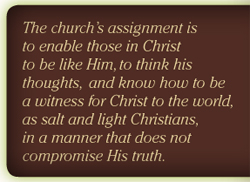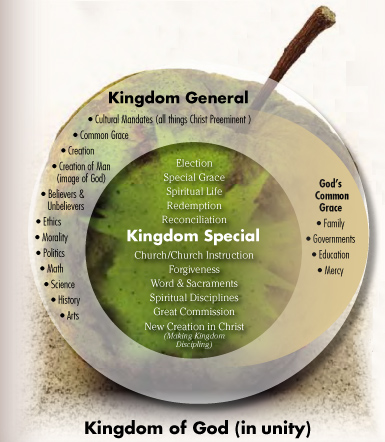|
THE PRESBYTERY OF NEW JERSEY, at its 140th meeting, in Middletown, New Jersey, March 17,2012, unanimously determined respectfully to request
THE GENERAL ASSEMBLY at its 40th meeting, in Louisville, Kentucky, June 19-22, 2012, to consider, approve and act upon the following
OVERTURE.
WHEREAS, the various parts of the Church, and of our denomination, are related, so “that its parts should have equal concern for each other” (1 Corinthians 12:25b), and WHEREAS, it “is the responsibility of every member and every member congregation to support the whole work of the denomination…” (BOCO 14-1.4), and WHEREAS, the “Bookstore” offers efficient and helpful service, produces and markets materials for our denomination, directs attention to Presbyterian and Reformed sources, regularly sells products at reasonable prices, often comparable to those of mass marketers, and WHEREAS, the “Bookstore” is not able to compete with advertising and marketing techniques of the mass marketers, THEREFORE, the General Assembly encourages the churches, members, committees, and agencies of our denomination to make all relevant purchases through the Presbyterian Church in America “Bookstore” and, as appropriate, to urge others to use its services. FURTHER, the General Assembly directs its Stated Clerk to forward this overture to the clerks of the various presbyteries, together with a request that they make it known among their presbyters and churches. Adopted by theNew Jersey Presbytery , on March 17, 2012. Attested by:
James A. Smith Stated Clerk of the New Jersey Presbytery |
Church Leadership
Should the Church Separate, Identify, Transform, or Effectively be Salt and Light in the World?
I have had people ask why it is so important to think from a kingdom world and life view perspective. Why is it important to have a right kingdom paradigm? Jesus said, “Seek first my kingdom…” The kingdom is our priority, if we listen to, seek to please, and serve Him. Of course, that requires knowing something about the kingdom in both its diversity of activities and roles, as well as its unity of purpose. Keep in mind, we are not speaking of the kingdom of God or kingdom of Christ in geographic terms, but rather of the rule and reign of the Lord Jesus as King over His kingdom. Things will change with His final return.
First, I would say that having the right kingdom perspective keeps our focus on the sovereign Lord and King. Life is really about Him and his will in the ultimate sense. We are here at His pleasure, and if we are in His favor, it is by His grace and mercy.
Second, a right view of the kingdom helps remind us that as Christians our lives are whole, not fragmented or chaotic. It avoids the mistake of saying one part of life belongs to the Lord and another part belongs to us, as though there is a part of life and reality that does not belong to the Lord. Life cannot operate with such a dualistic nor even antithetical view between the spiritual and the natural. There is no sacred and secular dualistic approach to life from a biblically reformed position.
Read entire issue of Equip to Disciple, 4th Quarter 2011 (Acrobat Reader required).
Third, being kingdom focused in the wholistic sense, enables us to see that the special and general kingdom are actually one. As one kingdom, it includes the kingdom of darkness (with a little “k”), which should help us remember the church’s mission, as delineated by Jesus in places such as the Great Commission, is the spiritual mission of making kingdom disciples that requires discipling in a way that helps Christians know how to be in the world but not of the world. That is critical.
In Making Kingdom Disciples, A New Framework, we pointed out something we have learned, especially from Ecclesiastes. You can be a Christian and think like a Christian, or you can be a Christian and not think like a Christian, or you can be a Christian and sometimes think like a Christian and sometimes not. The church’s assignment is to enable those in Christ to be like Him, to think His thoughts, as both David and Paul have reminded us (Ps. 139:17, Rom. 12:1 & 2), and know how to be a witness for Christ to the world, as salt and light Christians, in a manner that does not compromise His truth.
 Kingdom discipleship focuses on the transformation of the mind, not simply in an abstract way, but in a manner that enables Christians to know what God would have them to do in life, as they move outside the special kingdom (the church) into the kingdom general to live with a Christian perspective (see illustration on page 8). The key is to have a kingdom focus that understands and knows what it means to acknowledge King Jesus as Lord of all. Of course, you do not have to be a Christian to live in the kingdom general because it encompasses all of life and reality, but to be a Christian living in the kingdom, you must have a Christian perspective and commitment as you live each day. No matter whether you are a school teacher, a technician, a historian, a scientist, an artist, a politician, etc., God requires that we bring His will and the mind of Christ into all those areas of life. If the church is following His instructions regarding the discipleship of all Christians, young and old, we will be better equipped to live in this world in a way that brings honor and glory to our God and does so in a way that demonstrates a Christian influence in all things. Paul said, “Whether we eat or drink or whatever we do, we are to do all to the glory of God” (I Corinthians 10:31).
Kingdom discipleship focuses on the transformation of the mind, not simply in an abstract way, but in a manner that enables Christians to know what God would have them to do in life, as they move outside the special kingdom (the church) into the kingdom general to live with a Christian perspective (see illustration on page 8). The key is to have a kingdom focus that understands and knows what it means to acknowledge King Jesus as Lord of all. Of course, you do not have to be a Christian to live in the kingdom general because it encompasses all of life and reality, but to be a Christian living in the kingdom, you must have a Christian perspective and commitment as you live each day. No matter whether you are a school teacher, a technician, a historian, a scientist, an artist, a politician, etc., God requires that we bring His will and the mind of Christ into all those areas of life. If the church is following His instructions regarding the discipleship of all Christians, young and old, we will be better equipped to live in this world in a way that brings honor and glory to our God and does so in a way that demonstrates a Christian influence in all things. Paul said, “Whether we eat or drink or whatever we do, we are to do all to the glory of God” (I Corinthians 10:31).
As Abraham Kuyper demonstrated in his Lectures on Calvinism, and as does Robert Munger in his popular allegorical booklet My Heart, Christ’s Home, all of life belongs to Him. There is not one square inch that does not belong to Christ, as Kuyper said.
At this point I want to plant this “seed” and continue to water it as we move forward. One of the main concerns preachers and teachers should have, whether formally or informally, teaching the Word to children, youth, and adults, is this: “Are my students or members getting the truth and understanding that being a Christian involves more than the basic and essential personal relation with Jesus? Do they understand that Christianity is a way of life, not only at church or even at home, but in the world as well?”
You may have read or at least heard at some point about a book by Reinhold Niebuhr entitled Christ and Culture. He presents differing thoughts and views on how Christians should relate to their cultural setting. In that book Neibuhr lays out three possible models as they relate to the Christian and culture. The first is called the separational model which refers to Christians withdrawing from the world. The second is the identificational model which refers to Christians living in the world and often identifying, even compromising, with culture. The third is the transformational model which suggests that Christians are responsible to try to transform culture, its structures, laws, etc., seeking to end up with a Christian culture. You recognize that third model in some of the more recent movements such as “reconstruction theonomy” or “the moral majority” or “the new religious right movement.”
All three models revolve around how to be a Christian, in Christ, and how to live in the world in a way that does not compromise the Christian faith nor keep Christians from failing to serve God’s purpose in their lives. As the late Robert Webber once wrote, the issue is, “How can I be a Christian in this dog-eat-dog world?”
We respond to those three paradigms like this (by the way, there is some truth in each of the three though they are ultimately flawed in light of God’s Word):
First, the separation model reminds us that we are not to be of the world, in the sense that our morals, values, lifestyles, and ideologies are not to be determined by the world’s philosophies. However, the Bible does teach that we are to go into the world, yet doing so in a way that enables us to have a holy influence, by not withdrawing our Christian witness.
 Second, the identification model opens the door to be both in the world and of the world which usually translates that the world has more influence on us than we have on the world. Again, we can and should use much in our culture as a means of serving God and bearing witness to Christ, but not to the point of comprising any part of God’s truth. We live in a fallen world and our culture is not free from the kingdom of darkness influence. Actually, we live in daily spiritual warfare. A further point to remember about this second model is that the more we are like something, especially what we are speaking against, the less influence we will have in that circumstance to make a difference.
Second, the identification model opens the door to be both in the world and of the world which usually translates that the world has more influence on us than we have on the world. Again, we can and should use much in our culture as a means of serving God and bearing witness to Christ, but not to the point of comprising any part of God’s truth. We live in a fallen world and our culture is not free from the kingdom of darkness influence. Actually, we live in daily spiritual warfare. A further point to remember about this second model is that the more we are like something, especially what we are speaking against, the less influence we will have in that circumstance to make a difference.
Third, the transformation model indicates that Christians have the responsibility to build a Christian society which is done not only by word and deed but by legislation as well.
As we understand the Kingdom of God or Kingdom of Christ paradigm, we realize that while the kingdom is very present with us, there is also along with that now aspect, the not yet eschatological fulfillment that will happen only with the return of Christ. At that time everything will be transformed into the new heavens and new earth, but not until then will we see complete transformation.
If the above remarks are true, then what is the church’s collective and the Christian’s individual roles in the kingdom? In one sense, as many have said, the church is presently the most visible form of the kingdom; however, we must remember that while the church is that special part of God’s kingdom (see the diagram from the first article in Equip to Disciple, particularly in their roles of making disciples), it must do so in a way that enables Christians to live in the world, unspotted from the world, as “salt and light” Christians. And, we must realize, and not expect, the church, to move beyond its assignment into the general kingdom. For example, while the church must “teach us to observe all things that Christ has commanded,” including how to think from a Christian perspective regarding government or the state, the church does not make political statements that take it outside the kingdom’s special realm and task. Would that the kingdom general were more like the church but not the church like the kingdom general, in all the aspects of life and reality, at least not until Christ returns. However, I think we could say that if the church is faithful in carrying out its disciple-making role, there certainly should be a noticeable Christ-likeness in all areas of life from Christians.
We need to realize that while this approach will not end in cultural transformation, and God does not require that of us, it will enable Christians to be in the world but not of the world and to have, by God’s common grace, a godly influence on those around them without communicating a “holier than thou” attitude. That attitude may in fact give us an opportunity to speak prophetically to that situation or circumstance.
For example, in a certain high school mathematics class there appears to be cheating on tests and homework. It seems as though almost everyone is doing it. The Christian young person understands that he must live the truth, do his work, and trust the Lord for the results, even when his friends make it easy for him to follow their pattern. You see, that test or homework assignments are not about the student, they are about God whom the Christian represents in that class and what He expects from His students.
Or take the business man compiling his yearly taxes. He knows from some of his associates how to end run the system and violate some of the tax laws, but because his primary mission in his business is to serve Christ and seek to honor Him, he will not allow himself to follow their example.
Or think of all the wife or husband swapping going on in today’s world. Everybody does it and who cares, so what’s the big deal? Christians must care because God has clearly spoken His mind and will regarding sexual behavior and marriage. We do not participate in those activities that violate God’s revealed will. Why? To make us acceptable to God? No, because God, having already chosen us in Christ, desires that our motive be to please Him by living a godly and holy life.
 Developing this world and life kingdom focus means that sermons and Bible studies must be presented in such a way that helps the people to be able to make that kind of world and life view connection. We must know that people in the pew and in our classes struggle to make that connection. They often need help in doing that. So, rather than saying or being tempted to think, “The only way I can survive in this life is to compromise the Christian faith in the marketplace,” we stand strongly and firmly in the Lord and say, “Because of Christ, I cannot compromise His truth even if I am the only one not participating.” That’s where the church’s role to equip Christians to think like a Christian and to live like one, no compromise, but rather to live in a way where all for Jesus comes into play.
Developing this world and life kingdom focus means that sermons and Bible studies must be presented in such a way that helps the people to be able to make that kind of world and life view connection. We must know that people in the pew and in our classes struggle to make that connection. They often need help in doing that. So, rather than saying or being tempted to think, “The only way I can survive in this life is to compromise the Christian faith in the marketplace,” we stand strongly and firmly in the Lord and say, “Because of Christ, I cannot compromise His truth even if I am the only one not participating.” That’s where the church’s role to equip Christians to think like a Christian and to live like one, no compromise, but rather to live in a way where all for Jesus comes into play.
While it is true that Christians live in or may come from different cultures, one being family, another church, another the marketplace, in public and in private, the kingdom disciple, equipped and trained by his church and his own personal studies and devotions, realizes that his life is all about King Jesus. Even as he is trapped in the tension and temptation to be like the world, he realizes giving in to temptation is not God’s will for his life. And remember, as the Apostle Paul said in Romans 12: 1, 2, as we think with a transformed mind, transformed by the Word and Spirit, we will know what God would have us to do.
That, my friends, is what kingdom education or discipleship is all about. Equipping Christians to live for Jesus in a way that serves His purpose through us to this generation. And the earlier we understand that in our Christian lives, the greater our desire will be to serve and please him and consequently experience His power within us. As He said to Pilate on the night of the trial, “I have come to bear witness to the truth.” Those words from Jesus, at that crucial moment in His life, have a message for us. From cradle to grave we are to be people of the truth. That’s what the church is all about-the truth. Paul calls the church the ground and pillar of truth. God’s truth in all of life, helps us through encouragement, instruction, and fellowship as we seek to live for him each day.

We must work and pray for the church to maintain its spiritual role of making kingdom disciples in order for those disciples to live as a Christian in today’s world. One depends on the other even as both the kingdom general and the kingdom special work to serve the same end or purpose which is “seeking to bring honor and glory to God in all things.”
(In part three we will attempt to describe and design the church’s role in discipling God’s covenant people.).
How We Teach and How They Learn, Part 11 – Learning Styles and Questions
Many manuscripts are submitted to CEP for publication consideration. I like to read the Bible studies, but I don’t start with the written sections, rather, I start with examining the questions. I am convinced if the questions are not written well; the rest is just commentary and not Bible study.
Every question contains an “action verb.” This word determines the level of the question. Remember, the goal of Christian education is not just knowledge, it is changed lives, and this can only be accomplished when we put right knowledge into practice.
 Years ago it was established there are six basic levels by which actions verbs are measured:
Years ago it was established there are six basic levels by which actions verbs are measured:
Cognitive – This is the lowest level, asking students to recite information given to them.
Comprehension – This level helps the student move from memorization to understanding, such as discovering relationships among facts.
Application – Here the student takes what was learned and puts it into a new setting involving real life.
Analyze – This step requires the taking apart and examining each to see how it relates to the whole.
Synthesize – Now the student is able to take the parts analyzed and put it together into a different setting. This is higher critical thinking. Putting students into a role-play will move them to think through issues they may not have personally encountered, such as taking what they know about their Christian faith and witnessing to a Muslim.
Evaluation – This is the highest level of creative thinking. Now the student will be asked to judge between the good or bad, right or wrong, useful or useless, etc. Competent evaluation requires good analysis.
The cognitive level might be the lowest level, but it is still an important level. Memorizing the books of the Bible may seem mundane, but it is important in enabling students to move to the next level of study.
Read entire issue of Equip to Disciple, 4th Quarter 2011 (Acrobat Reader required).
A colleague of mine in Kenya once told me if he could just get the faculty to teach to the application level he could die a happy man. But, if our goal is to see the lives of those entrusted to us changed, then we must understand the process by which this is done. Memorizing the books of the Bible will not get anyone growing spiritually. They need to be taught to dig into the Bible at a higher level. Memorizing verses will not get them growing spiritually either. (I must add here this is sadly a lost art in the church today, and needs to be rectified.) Learners must understand those verses and be able to apply them. Then they can be taught to think critically about those verses so they will be skilled in growing on their own and be able to teach others also.
When you ask questions in class, or when you write them in a study, you need to evaluate (highest level) your questions. This, again, is determined by the action verbs you use. We will post this article on our website along with a chart giving you the action verbs for each category. Remember, there are times for low level questions, but these should be minimal. Higher critical thinking produces Kingdom minded Christians who know how to think and evaluate their lives and the world around them.
Using higher critical thinking questions works for all learning styles. However, the analytics will be content to stay with the learning of facts. This is never satisfactory, as God requires us to put His Word into practice.
If you are thinking about submitting a manuscript to us, I suggest evaluating your questions first.
The Task of Christian Education
Editor’s Note: This past summer the Orthodox Presbyterian Church, with whom we partner in our Great Commission Publication venture, celebrated its 75th anniversary. The OPC and the PCA formed the partnership in 1975. The following comments are from the oldest living OPC Minister and a former member of the GCP Board. With the permission of New Horizons, we have excerpted a portion of an address Dr. John Galbraith delivered at that assembly on the topic of Christian Education.
 …One thing that was very important to that first Assembly (OPC) was the preaching and teaching of the Word of God. And to do it, the assembly immediately set up three committees to help the congregations as then existed and those that would be formed. Those committees were the Committees on Home and Foreign Missions and Christian Education. The Committees on Home and Foreign Missions had one message. They were obeying Jesus Christ, who said specifically what we were to do. He said in Acts 1, “Ye shall be my witnesses unto me both in Jerusalem, and in all Judaea, and in Samaria, and to the ends of the earth.” In Matthew 28, he said, “All authority is given unto me in heaven and in earth. Go ye therefore, and teach.” That was not just a missionary goal. That teaching included the Bible, the entire content of the Word of God. We came to think of that then, and to call it the Reformed Faith, after the Reformation.
…One thing that was very important to that first Assembly (OPC) was the preaching and teaching of the Word of God. And to do it, the assembly immediately set up three committees to help the congregations as then existed and those that would be formed. Those committees were the Committees on Home and Foreign Missions and Christian Education. The Committees on Home and Foreign Missions had one message. They were obeying Jesus Christ, who said specifically what we were to do. He said in Acts 1, “Ye shall be my witnesses unto me both in Jerusalem, and in all Judaea, and in Samaria, and to the ends of the earth.” In Matthew 28, he said, “All authority is given unto me in heaven and in earth. Go ye therefore, and teach.” That was not just a missionary goal. That teaching included the Bible, the entire content of the Word of God. We came to think of that then, and to call it the Reformed Faith, after the Reformation.
Now, there is a difference between the two missions committees and the Committee on Christian Education that should be noted. Those two missions committees do their work and carry on their ministries outside the Orthodox Presbyterian Church. They preach to those who are without. The Committee on Christian Education, however, teaches and preaches to those of us who are within. This is a monumental task because it means the Committee on Christian Education teaches those who are to teach. It is a committee to teach teachers.
Read entire issue of Equip to Disciple, 4th Quarter 2011 (Acrobat Reader required).
But, a lot more than that, it is a committee that goes from the cradle to the grave. It picks up through the ministry of Great Commission Publications. It picks up through children who haven’t yet gone to school and it leads congregations to teach the scripture to those little, tiny tots. It teaches the scripture itself, and what we believe the Scriptures teach, in the Catechisms…
 …I say to you that the work of the Committee on Christian Education is the basic agency of the General Assembly. It is not more important than missions, not at all. How could you beat the importance of those words of Jesus, “Go and teach”? Those are not just important; those are essential, and we must not give them up. But what I am saying is that the Committee on Christian Education has helped our churches to teach those people who go out as missionaries and teach the Word.
…I say to you that the work of the Committee on Christian Education is the basic agency of the General Assembly. It is not more important than missions, not at all. How could you beat the importance of those words of Jesus, “Go and teach”? Those are not just important; those are essential, and we must not give them up. But what I am saying is that the Committee on Christian Education has helped our churches to teach those people who go out as missionaries and teach the Word.
We should be thankful on this occasion of the seventy-fifth anniversary of our church. God has been good. We have missed many times in our aims. We have sinned. Let’s not forget that. We cannot boast that we are the perfect church. We are so far from it. But there is one thing for which we can give God thanks: for moving us to desire, seek, and be faithful, as far as we are able, to God’s Word.
God has given us a promise in Isaiah and in Habakkuk that the knowledge of the Lord will fill the earth as the water covers the sea. The hymn writer picks up that thought. He changes the venue a bit. He says, “Jesus shall reign where’er the sun does his successive journeys run.” We believe that. We sing that. God has called upon us to maintain a faithful and energetic Committee on Christian Education….
…I say to you, “Keep standing fast.” That doesn’t need any exegesis. You know exactly what it means. Stand fast in the faith once delivered to the saints. Stand fast on the Word of God, and then get going on the things that God has given us to do. Teach our people well. Teach them to do their job, and to do it well. And to that I think I can say only my own amen and say also, to God be the glory…
2,000 Participants Gather in Atlanta for the Amazing Grace 360 Conference
2,000 participants came together at the Cobb Galleria, Atlanta, Ga., Friday, Saturday and Sunday, in Atlanta, for the PCA’s 5th Christian Education and Publications Women’s ministry conference, Amazing Grace 360 emphasizing the whole Gospel for the whole life and whole world. Older women and younger women came from across the PCA with representatives from several countries where PCA ministry is realized. 200 of the participants were under 20 years of age and 200 were over 66 years of age.
With the confusion abroad about “grace” the conference sought to present a program that would encourage and enable the participants to understand the “it is all about God” who is a God of grace and mercy. That theme was carried throughout the conference with Nancy Guthrie leading the plenary sessions unfolding the whole story of: creation, the fall, redemption, and consummation (covered by Brian Habig mentioned below). Her messages were clear and set the stage for the more than 30 seminars on different aspects of the whole story.
500 of the participants came for the pre-conference events which featured Lydia Brownback as the plenary speaker and breakout seminars for that “pre-con” event. Kevin Twit and the Indelible Grace effectively led the conference in the worship sessions. Kevin Twit is a PCA teaching elder and has assisted CEP and the women’s conferences on previous occasions. One of the highlights of the conference, along with the good solid teaching and warm fellowship of the participants, was a Friday night concert, featuring Laura Story an accomplished singer and songwriter and winner of the prestigious Dove Award for her album Great God Who Saves and who serves on the worship leadership team at the Perimeter PCA Church in Duluth, Ga., and a Saturday night concert featuring Kevin Twit and the Indelible Grace.
The Indelible Grace has produced a number of CD’s especially featuring some of the great hymns often set to new music. Kevin is a graduate of Covenant Theological Seminary. He is also known as a RUF (Reformed University Fellowship) campus minister at Belmont University in Nashville, Tn.
Another highlight of the conference, following the Saturday night dinner, came as
PCA women from across the church and from more than eight countries were introduced who then brought greetings from such respective locations: North America, Mexico, Dominican Republic, Germany, Ukraine. Etc. The evening session was narrated and led by Barbara Thompson of Zachary, La., and Susan Phyllis of Hendersonville. North Carolina. The theme for the evening was appropriately called, “faces of grace.” During that evening session the wives of PCA military chaplains, especially those serving in Afghanistan and Iraq, were asked to stand to an auditorium filled with a standing ovation for their families’ service to God and our country’s security.
Joni Erickson Tada addressed the conference via video and brought encouraging words to those who have known suffering and the Lord’s faithfulness in sustaining them through difficult times. Nancy Guthrie who had experienced the pain of losing two children was able to meet with many of the mothers present with similar experiences. A fitting climax of the Saturday evening event was remembering Georgia Settle, now with the Lord, who served as the first coordinator of women’s ministry with CEP and the PCA. Her husband Paul, a former coordinator of CEP, was welcomed. He brought a brief message and prayer for the conference.
Brian Habig concluded the conference in the Sunday morning worship with a message from Romans 8 entitled “Home.” The morning message drew together the “consummation perspective,” in a most effective way, the theme and the variations on that theme throughout the conference. Brain, a former RUF minister, presently serves as pastor of the Downtown Presbyterian church in Greenville, South Carolina
One of the highlights of the conference was giving the participants an opportunity to see the more that 50 exhibits some featuring a variety of ministries in the church and to see the many training resources and study materials available from CEP. One the participants remarked, “I have never seen so many good resources that relate to women’s ministry in one place.”
CEP Coordinator Charles Dunahoo said before the conference, “We have carefully designed the entire conference around the theme Amazing Grace 360-focusing on God’s grace, not from an “easy believism” concept of grace, but from a biblically historical redemptive focus on Christ and his sufficiency that will highlight, “The whole Gospel, the Whole life, and the Whole World.” As the conference ended he said “God allowed us to experience that purpose in even greater measures than anticipated.”
Jane Patete, CEP’s women’s ministry coordinator said, “Our prayer was for the Triune God to be lifted before the conference in teaching, fellowship, prayer, and singing the songs of the Kingdom, and that we all would be reminded of his redeeming grace and equipped to live and serve as the citizens of the his Kingdom.” “God answered our prayer,” she said as the conference closed. “To him be the glory.”
You Were Made to Last Forever
Download the You Last Forever postcard that can be used as a bulletin insert, visitor followup, and many other things.
You Were Made to Last Forever is an effective method for sharing the Faith with people. PCA Teaching Elder Dick Fisher has developed a number of resources that you can access easily and effectively. This program is being used effectively in a number of different settings. It is a useable resource that will enable you to better present the Gospel.
Click here to visit the website
Watch the video below to learn more about You were Made to Last Forever:

